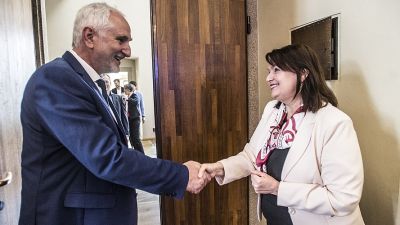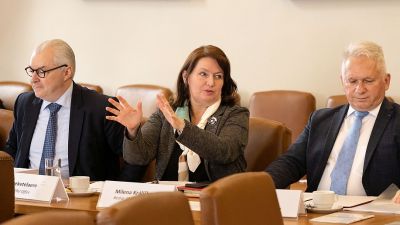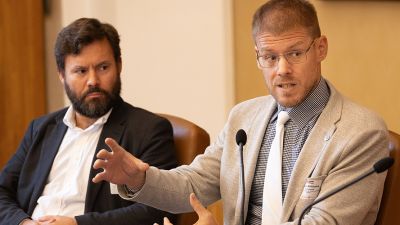Charles University – with four of 17 faculties directly involved – took an historic step on Friday jointly launching a new Supply Chain Resilience Center together with the National Chengchi University in Taiwan. The centre is part of a multifaceted project that will research not only the stability of supply chains in the face of shifting factors, but, with other Czech Republic-based centres and the Taiwanese government, will help boost the semiconductor sector in the Czech Republic.

Distinguished participants & honoured speakers ahead of Friday's ribbon-cutting ceremony incl. CU and National Chengchi University rectors
Tsai Zen-Li and Milena Kralíčková, in centre.
In attendance on Friday at the Carolinum – the heart of Charles University – was not only a welcome Taiwanese delegation but Czech political representatives, namely the head of the Czech Senate Miloš Vystrčil and the speaker of the Czech lower house, Markéta Pekarová Adamová, as well as university representatives including both rectors of the respective schools. Senate Chairman Vystrčil described his well-documented past visit to Taiwan as beginning to correct “just a little” what he called a “democratic deficit” which had not been picked up after the late Václav Havel visited Taiwan in 2004. Shared democratic values, Vystrčil made clear, had made such a joint project possible and on Friday he welcomed the opening of the new centre and CU’s involvement:
“The opening of the Supply Chain Resilience Center is another result of our cooperation with Taiwan. I am pleased that this cooperation focuses on the sciences, research in high technologies and their connection to the market. This can bring us closer to strategic independence and strengthen our competitiveness. Special thanks go to Charles University and the National Chengchi University, which took on the implementation of the six-million-dollar project.”


Left: The head of the Czech Senate, Miloš Vystrčil. Right: The speaker of the lower house, Markéta Pekarová Adamová.
The centre is being established as a joint consortium of National Chengchi University, where activities are coordinated by the International College of Innovation; and Charles University, where activities will be run by four faculties and coordinated by the Faculty of Social Sciences assuming a leadership role. David Emler, the faculty’s Vice-Dean for Development and the Institute of International Studies, explained that supply chains had been shown to be more brittle than might have been expected. Hence the need for advance planning and research to offset future potential crises:
“The coronavirus pandemic, Russian aggression in Ukraine, and the poor availability of some essential medicines in Europe, for example, show us how fragile are the threads that connect our global community,” he explained. It was not long ago at all that supply chains were shaken to their core when the Covid pandemic hit and shoppers scrambled frantically to stock up on items they feared would no longer be easily available.”


Left: Vice-Dean David Emler. Right: Charles University Rector Milena Králíčková.
Charles University Rector Milena Králíčková was in agreement that the time to plan was now and expressed the hope the centre would be more than useful:
“The role of universities is proving indispensable in addressing new global challenges. Supplier resilience is one of the important aspects of our competitiveness and also our readiness to deal with critical situations. The experts of Charles University and National Chengchi University associated in the Supply Chain Resilience Centre will not only assess these patterns, they will also offer concrete solutions that we believe will contribute to the economic development of our country.”

National Chengchi University President Tsai-Yen Li at Charles University on 24 November 2023 ahead of the official launch of the new centre.
Similarly, Taiwanese guests in Prague Friday emphasised the important role of supply stability.
"I am pleased that National Chengchi University can represent Taiwan in a joint effort with Charles University in the Czech Republic to advance research in the semiconductor supply chain. We are keenly aware of the importance of a stable supply of semiconductors for national security, democracy, freedom, and a sustainable future," said National Chengchi University President Tsai-Yen Li.
The activities of both universities were also praised by the Speaker of the Chamber of Deputies of the Parliament of the Czech Republic, Markéta Pekarová Adamová.
"Thanks to the efforts of my colleagues from Charles University and National Chengchi University, the Centre for Supply Chain Resilience was opened less than eight months after the signing of the Memorandum of Understanding during my visit to Taiwan. We have much in common with Taiwan. Both our countries had to earn their freedom and democracy. We have a similar experience of living in the sphere of influence of a non-democratic power. That is also why we find a common understanding in working together to protect our countries, our citizens and their prosperity. Moreover, Taiwan is a global player in the semiconductor industry. This is one of the areas in which reducing China's influence is a priority. Therefore, I believe that the results of the Center's work will be very beneficial for us all,“ she stated in the Hall of Patriots.
With the development of the Supply Chain Resilience Centre, the universities are committed to studying the availability of highly skilled labour as well as to exploring the capacity of chip manufacturing itself and its sustainability, including its impact on the environment and climate in general. The Centre, which will involve experts from the Faculty of Arts, Law and Science of the University, in addition to the Faculty of Social Sciences, will focus mainly on practical and applied outputs.




















